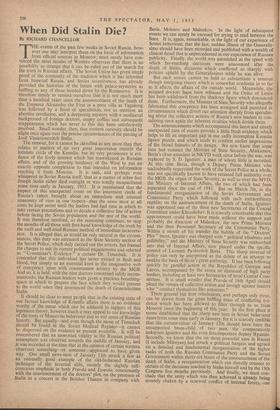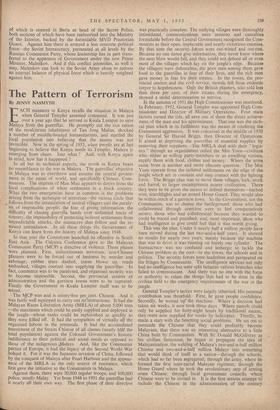When Did Stalin Die?
By RICHARD CHANCELLOR THE events of the past few weeks in Soviet Russia, how- ever one may interpret them on the basis of information from official sources in Moscow, must surely have con- vinced the most insular of Western observers that there is no possibility so strange that it can be ruled out of the search for the truth in Russian affairs. The Soviet Union has given ample proof of the continuity of the tradition which it has inherited from Imperial Russia, and Soviet secretiveness has already provided the historian of the future with palace-mysteries as baffling as any of those handed down by the Romanovs. It is therefore timely to remind ourselves that it is not much more than a hundred years since the announcement of the death of the Emperor Alexander the First in a poor villa at Taganrog was followed by a flood of speculation, not to mention an abortive revolution, and a deepening mystery with a mediaeval background of foreign doctors, empty coffins and subsequent reappearance which has never to this day been satisfactorily resolved. Small wonder, then, that western curiosity should be alight once again over the precise circumstances of the passing of Josif Vissarionovitch Stalin.
The rumour, for it cannot be classified as any more than that, relates to matters of _ no very great importance outside the intimate circle of the Kremlin, but its very persistence is evi- dence of the lively interest which has reawakened in Russian affairs, and of the growing tendency of the West to put an exactly opposite complexion to that intended on information reaching it from Moscow. It is said, and perhaps even whispered in Soviet Russia itself, that as a matter of sober fact Joseph Stalin either died outright or was totally incapacitated some time early in January, 1953. It is maintained that the impact of this unexpected event on the innermost circle of Russia's rulers brought about an immediate and unusual unanimity of view in one respect—that the news must at all costs be kept secret until the leaders had had time in which to take certain precautions and to decide a collective line of action before facing the Soviet population and the rest of the world. It was therefore resolved, so the reasoning continues, to stop the mouths of all those with first-hand knowledge of the truth by the swift and well-tried Russian method of immediate incarcera- tion. It is alleged that, as would be only natural in the circum- stances, this duty was entrusted to the State Security section of the Secret Police, which duly carried out the arrests, but framed the charges to suit its current political requirements and selected as " Commissar's Evidence ' a certain Dr. Timashuk. It is contended that this individual has never existed in flesh and blood, but simply as an essential knot in the imaginative web of conspiracy spun with consummate artistry by the MGB. And so, it is held, with the nine doctors concerned safely incom- municado, the Russian leaders were given a precious breathing- space in which to prepare the face which they would present to the world when they announced the death of Generalissimo Stalin.
It should be clear to most people that in the existing state of our factual knowledge of Kremlin affairs there is no evidence worthy of the name which can be adduced in support of this ingenious theory, however much it may appeal to our knowledge of the roots of Muscovite behaviour and to our sense of Russian history. But equally—and even though the name of Timashuk should be found in the Soviet Medical Register—it cannot be disproved on the evidence st present available. - It will be remembered that an unwonted vitality in the Russian political atmosphere was observed towards the middle of January, and it was recorded at the time that in the opinion of certain western observers something—or someone—appeared to have given way. One small news-item of January 13th struck a few as an unusually good example of the old-fashioned Russian technique of the inverted alibi, namely the slightly self- conscious emphasis in both Pravda and Izvestia, concurrently with the announcement of the doctors' plot, on the presence of Stalin at a concert in the Bolshoi Theatre in company with Beria, Molotov and Malenkov. In the light of subsequent events we can surely be excused for trying to read between the lines. It is, again, remarkable, in the light of our experience of Soviet behaviour, that the last, sudden illness of the Generalis- simo should have been recorded and published with a wealth of clinical detail that is unprecedented in our experience of Russian publicity. Finally, the world was astonished at the speed with which far-reaching decisions were announced after the death of Stalin, decisions which conflicted so sharply with policies upheld by the Generalissimo while he was alive.
But such straws cannot be held to substantiate a tenuous though intriguing theory which is somewhat academic in so far as it affects, the affairs of the outside world. Meanwhile, the accused doctors have been released and the Order of Lenin has been withdrawn from the shadowy figure which denounced them. Furthermore, the Minister of State Security who allegedly fabricated this conspiracy has been arraigned and punished in circumstances which divert our attention sharply from speculat- ing about the collective actions of Russia's new leaders to con- sidering once again the inherent rivalries which divide them.
The announcements which accompanied this latest and utterly unexpected turn of events provide a little fresh evidence which helps to fill an important gap in our sadly incomplete Kremlin jigsaw puzzle, and which tends to confirm earlier impressions of the broad features of its design. We now know that some time last summer the Minister of State Security, Abakumov, Beria's close associate in NKVD work since before the war, was replaced by S. D. Ignatiev, a man of whom little is recorded. At this tinge Beria, though a Deputy Prime Minister who undoubtedly supervised the work of the Secret Police as a whole, was not specifically known to have retained full authority over the MGB, the organ of State Security, as well as over the MVD, the Ministry of -Internal Affairs, the two of which had been separated since the end of 1943. But on March 7th, in the fundamental reorganisation of the Soviet Government and Communist Party which followed with such extraordinary rapidity on the announcement of the death of Stalin, Ignatiev was appointed one of the three new Secretaries of the Central Committee under Khrushchev. It is scarcely conceivable that this appointment could have been made without the support and probably the direction of Malenkov, the new Prime Minister and the then Personnel Secretary of the Communist Party. Within a month of his transfer the bubble of the " Doctors' Plot " burst, Ignatiev was charged with " political blindness and gullibility," and the Ministry of State Security was reabsorbed into that of Internal Affairs, now placed under the specific control of Lavrenti Pavlovitch Beria. This sharp reversal of policy can only be interpreted as the defeat of an attempt to weaken the basis of Beria's great authority. It has been followed quickly by parallel action in the Republics of Georgia and Latvia, accompanied by the arrest or dismissal of high party leaders, including at least two Secretaries of local Central Com- mittees. It is small wonder that Pravda of 16th April should plead the virtues of collective action and inveigh against leaders who " conduct themselves like autocrats."
Three general but firm conclusions, and perhaps only three, can . be drawn from the great baffling mass of conflicting evi- dence which has been allowed to filter through to us from Moscow since the beginning of this year. In the first place it seems established that the ,sharp new turn in Soviet behaviour dates, from some time early in January, for it is scarcely credible that the curtain-raiser of January 12th should have been the unsupported brain-child of two men, the comparatively unknown Ignatiev and his even less-important deputy Ryumin. Secondly, we know that the six most powerful men in Russia (I include Mikoyan) had struck a political bargain and agreed on a detailed and fundamental reorganisation of the higher ranks of both the Russian Communist Party and the Soviet Government within thirty-six hours of the announcement of the death of Stalin, a reorganisation which ran directly counter to certain of the decisions reached by Stalin himself and by the 19th Congress five months previously. And finally, we must con- clude that the unity which was then achieved is already being severely shaken by a renewed conflict of internal forces, one of which is centred in Beria as head of the Secret Police, both sections of which have been reabsorbed into the Ministry of the Interior, backed by the formidable MVD Praetorian Guard. Against him there is arrayed a less concrete political force—the Soviet bureaucracy, permeated at all levels by the Russian Communist Party, whose leadership has in part trans- ferred, to the apparatus of Government under the new Prime Minister, Malenkov. And if this conflict intensifies, as well it may, Malenkov can look to the Soviet Army alone to redress an internal balance of physical force which is heavily weighted against him.



































 Previous page
Previous page